Posts Tagged ‘Seattle’
World Relief Cup 2023
“When I walked into World Relief, I received way more than what I expected.”
—Bertrand
Celebrating World Refugee Month
Bertrand, a Career Pathways Coordinator, shared his experience at the World Relief Cup, as a participant who was resettled through our office.
“When I look back at my journey as a participant being resettled by World Relief, I am humbled and will forever be grateful for the opportunity for a fresh start…Today I am [able to be] World Relief to new famil[ies] walking through our doors. There are many great resettlement organizations out there but only a few do this work from a posture of servants and advocates.”
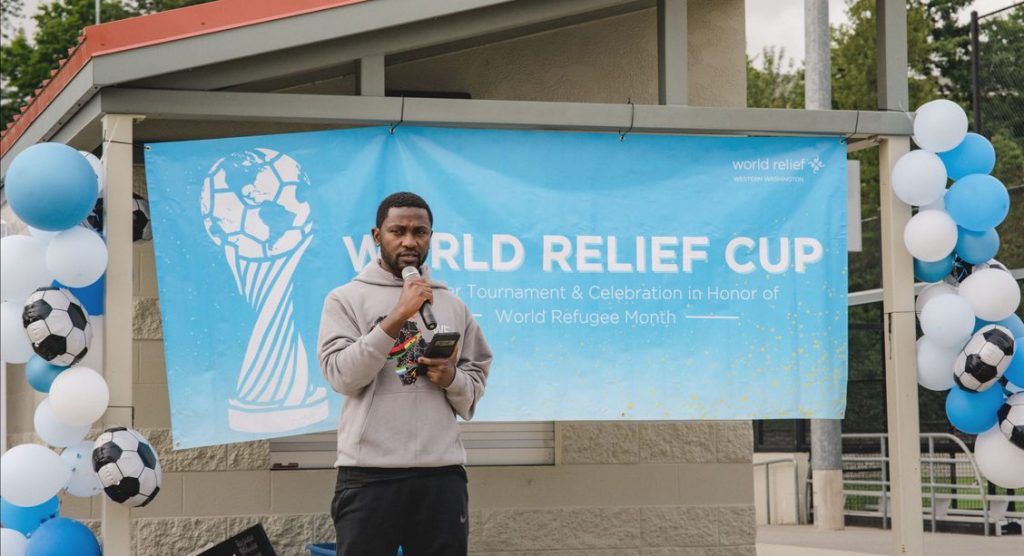
Bertrand shared his story as an asylee and being a recipient of the Match Grant program. He expressed his deep gratitude to the people who partnered with him from World Relief, like his case worker Jacob and the employment team.
As a staff member, he is proud to have the opportunity to now walk alongside participants on “the road to independence and a holistic self-sufficiency”.
We are so grateful to have individuals Bertrand on the World Relief team! Bringing his experience to his work, he is a part of creating lasting change for every refugee and immigrant.
More from the World Relief Cup
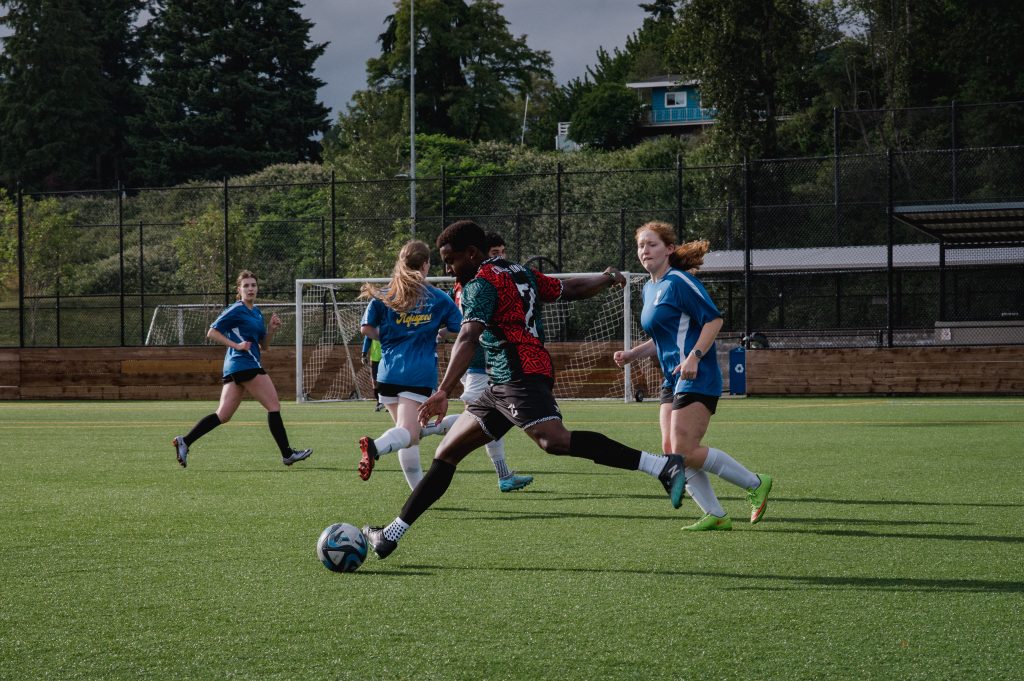
Through soccer, the Cup engaged the community in supporting refugees and immigrants. With the sponsorship and commitment of the community, we hosted a soccer tournament on June 10th to celebrate World Refugee Month! There were 11 teams with around 120 players who participated; including teams from local resettlement agencies, community leagues and our own World Relief Team.
While it was a drizzly morning, there was an amazing turnout! People came out in support of their friends, teams, and the work of resettlement through World Relief. Many people were engaged in conversation with members of our staff, getting to know our mission and vision. Many teams had players who have experienced resettlement as well as teams from other services organizations, like the International Rescue Committee.
People experienced World Relief through a unifying sport, having the chance to interact with others from across cultures and the community.
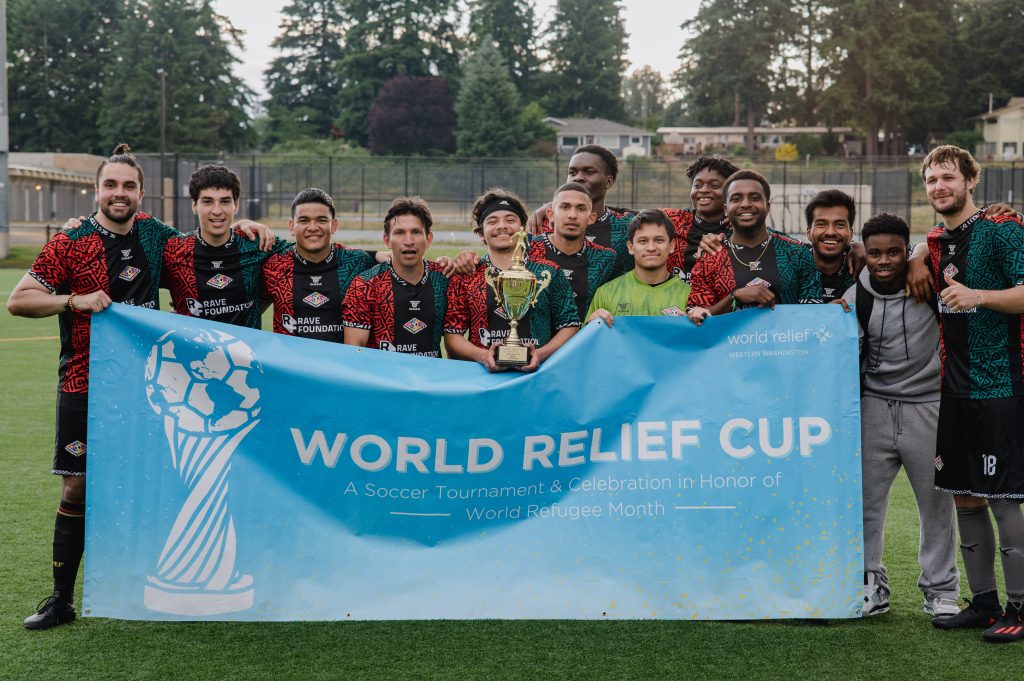
2023 World Relief Cup Champions
Congratulations to Cultures FC and their win!
2nd Place: Jake for a Cause | 3rd Place: Seattle Flounders
A Prayer for Refugees
On June 14, a ship carrying migrants bound for Europe capsized in the Mediterranean Sea. Despite search and rescue efforts, hundreds are feared dead.
Even as we celebrate the strength and resilience of refugees this World Refugee Day, we lament that, for so many people seeking safety and a more hopeful future in a new land, the route is often marked by unnecessary hardship and trauma.
At World Relief, we are mourning with those who have lost loved ones in this tragedy, and we pray that God would give us the courage to not look away.
Will you join us in praying for refugees and those seeking safety around the world?
Father, I still my heart and mind to focus on you. Speak, your child is listening.
(Pause in silence and prayer)
Read: “The Lord your God is supreme over all gods and over all powers. He is great and mighty, and he is to be obeyed. He does not show partiality, and he does not accept bribes. He makes sure that orphans and widows are treated fairly; he loves the foreigners who live with our people, and gives them food and clothes. So then, show love for those foreigners, because you were once foreigners in Egypt.” — Deuteronomy 10: 17-19 (GNT)
How wonderful and powerful you are, Lord. Help me to reflect you and love like you.
(Pause in silence and prayer)
Today, I pray for those who are vulnerable and who may not be able to see your might and presence in their lives at this moment. I pray for those fleeing violence, wars and persecution; be their guide and comfort. For the millions of refugees around the world, waiting for justice and a new home.
(Pause in silence and prayer)
I pray for my city and community. May it be a place of safety, support and solace for those in distress.
(Pause in silence and prayer)
Lord, I think about our nation’s leaders and government. May they use their positions of power to work towards justice and righteousness.
(Pause in silence and prayer)
I pray for your church, that it would be a city on a hill, shining bright as a beacon for all who seek a new and better way.
(Pause in silence and prayer)
Lastly, I stand firm, covered with the armor of God, and pray against the work of the enemy, who comes to kill, steal and destroy.
(Pause in silence and prayer)
I offer this prayer to you and declare that yours is the kingdom and the power and the glory forever. Amen.
The Drivers of Mass Displacement: Ukraine and Beyond
Nyakaar abandoned her home in South Sudan when armed conflict threatened her village. She found safety in the Bentiu Protection of Civilians camp, a U.N.-run camp for internally displaced South Sudanese people where World Relief operates health and nutrition programming. Shortly after arriving, Nyakaar gave birth to her son, Bone.
In the world today, a record-breaking 117.2 million people have been forced to flee their homes. That’s about 1 in every 78 people that live across the globe.*
While many of us think of refugees when we hear the words “mass displacement,” the majority of displaced people worldwide are actually internally displaced people like Nyakaar and Bone.
The causes of mass displacement are many, and the repercussions reach far and wide. Today, we’re taking a bird’s eye view of the topic of mass displacement to help you understand what causes people to leave their homes, who is fleeing and how people across the globe are joining World Relief to address the drivers of mass displacement and care for those who are displaced.
*These numbers reflect the latest estimates from the U.N. High Commissioner for Refugees. This blog was originally written May 10, 2022 and updated on April 11th, 2023.
What causes mass displacement?
People are displaced from their homes for myriad reasons — persecution, conflict, violence, human rights violations and climate-related factors to name a few.
The Russian invasion of Ukraine has been the most recent example of how war can force millions of people to flee their homes. However, there are many other conflicts and crises occurring in the world which are also causing people to flee their homes.
For example, violence in the Darfur region of Sudan has caused many to flee in search of a safe place to live, farm and raise their children. Some of these families remain internally displaced while others have fled across international borders into Chad and other surrounding countries. Apart from the unfolding crisis in Ukraine, 68% of the world’s refugees have come from the following five countries: Syria, Venezuela, Afghanistan, South Sudan and Myanmar. Though crises like these have received varying levels of media attention, the needs of the displaced remain critical.
Refugees, Asylum Seekers and IDPs
Many times, displaced people flee to regions or countries surrounding their home region, while a smaller percentage relocate to a more distant country. A displaced person can fall under several categories:
- Internally Displaced People
- Refugees
- Asylum Seekers
Internally Displaced People make up the largest category. These are people who have been displaced within their own country. They have been forced to flee their home and region, and have resettled in a different part of the same country in which they already lived. Currently, 61.2 million people are classed as Internally Displaced People.
Refugees make up the next largest group of displaced people. These are people who have fled war, violence, conflict or persecution and have crossed an international border to find safety in another country. It’s likely that you’ve read stories of refugees like Bohdan, Abdinasir and Amira — all people who left their home countries due to conflict or persecution, applied for refugee status and were resettled right here in the United States.
Today, there are about 29.3 million people with refugee status in the world.
In 2022, the U.S. has agreed to resettle up to 125,000 refugees plus an additional 100,000 Ukrainians who have fled the Russian invasion. As is evident, there are far more refugees in the world than can be resettled even in a country as large and as resourced as the U.S.
Asylum seekers make up the third and smallest category of displaced people. These are people who have fled to another country, but who have not yet been granted official refugee status. These women, men and children may have to wait years to receive an official status.
Currently, there are about 5.6 million asylum seekers living around the world today.
Host Communities
One final impacted group remains to be identified, and these are the host communities.
Host communities have not been displaced from their homes, but the swift influx of refugees into their communities severely impacts those who already lived in the region. Often host community members need the same support that refugees, asylum seekers and internally displaced people typically receive.
A large number of refugees can mean reduced access to land and water and can cause a scarcity in resources. For example, in Sudan, conflicts have broken out over land usage, as host communities and displaced people seek to utilize the scarce land and water resources available in the host community area.
World Relief works within these communities to increase access to clean water as well as facilitate peace committees to solve interpersonal conflicts before they grow.
What else is World Relief doing to help?
After a person is displaced, they can either choose to return to their home, or they can resettle in a new location. However, for many, the option to return home is not a viable one, as drivers of displacement often last for generations. World Relief is currently serving displaced people across the globe in several ways:
- In DR Congo, a country that’s facing one of the world’s worst hunger crises, World Relief works with host communities and with displaced people who have returned home by providing agricultural training and farming supplies to help families grow crops to feed their families and sell the surplus in local markets to earn an income.
- Globally, World Relief serves refugees who have crossed the border into our international countries of operation, working with local partners to provide emergency aid to families living in temporary shelters.
- In the U.S., World Relief partners with the U.S. government to resettle refugees. We also serve asylum seekers and other immigrants by providing community connections, legal services and other vital services like ESL classes, job training and more.
- In Sudan, South Sudan and DRC, World Relief serves internally displaced people by equipping local village peace committees and providing health, nutrition, WASH, education, agricultural programming and more.
- World Relief also advocates for the vulnerable when injustice occurs. We believe speaking up along with the poor and oppressed is an important witness to a watching world about the character of Jesus.
Mass displacement remains one of the largest and most challenging crises of our time — a truth that will take intentional coordination and investment between local and international communities, churches, governments and non-profit organizations to address.
At World Relief, we believe Jesus came to earth to love the vulnerable. Jesus didn’t bring hope and salvation from a distance. Instead, he came to us, showed us love and suffered with us. Whether we are welcoming refugees and asylum seekers into our own communities or providing relief to those displaced overseas, we get to be the hands of feet of Jesus, sharing his love to a world in need.
To learn more about how you can help refugees and displaced people in the U.S., visit our private sponsorship page.

Lydia Dawson served as World Relief’s Humanitarian and Disaster Response Unit Program Officer in Sudan, and in disaster response worldwide. Prior to joining World Relief, Lydia worked in homeless services and community development in Oregon and California. She is passionate about equity and honor for underrepresented groups, both locally and internationally.
“When You Cook, You Have To Cook From Your Heart”
OPENING THE COMMERCIAL TEACHING KITCHEN IN KING COUNTY
Several years ago, World Relief Western Washington (WRWW) hosted a listening session where the local refugee-immigrant community could gather and openly share their needs, struggles, and hopes. What resulted was a dream we decided to help make a reality. With the support of funding from King Conservation District, The WA Commerce Department, the U.S. Small Business Administration, private donors, and generous architects and construction crews, we constructed a commercial teaching kitchen. Soon the 1,215 sq. ft. commercial teaching kitchen will be complete and open for programming including cooking and nutrition workshops and a food industry career pathway course!
Cooking is important to us. We learned this as we listened to the community. Through food we build community, sharing in each other’s joys and sorrows, and inspiring dreams as we nourish our bodies. Listen long enough to the stories of the people around you, and you will see this too.
“When you cook, you have to cook from your heart.”
—Cooking advice shared by a recent arrival from Afghanistan who loves experimenting with traditional recipes and cooking for his friends and family.
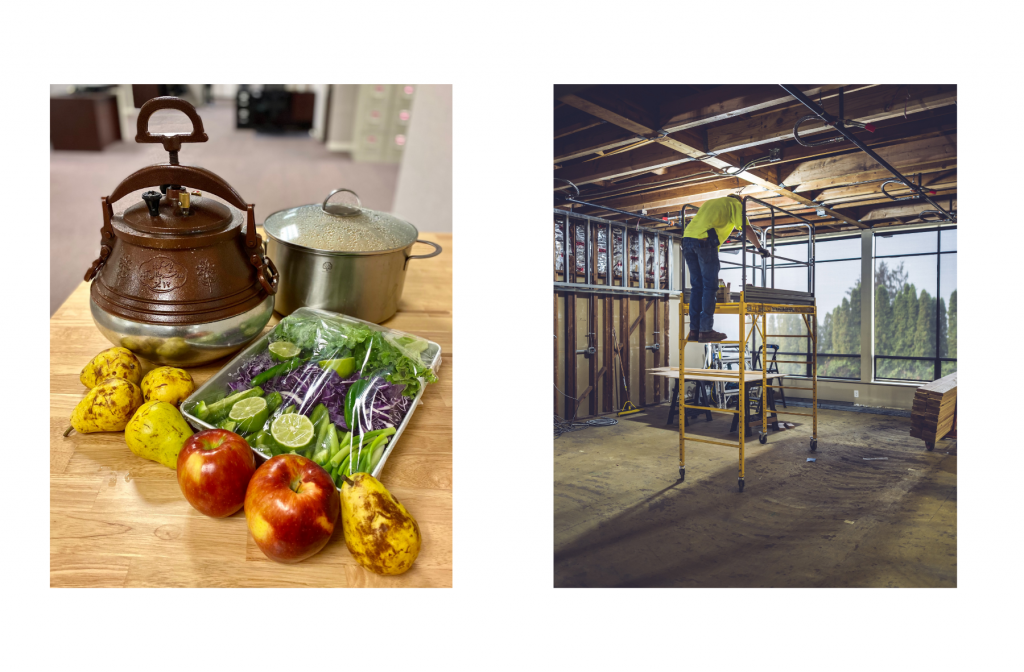
A KITCHEN TO GATHER PEOPLE
“I love to bring joy to people with my baking,” says Katya, a new arrival from Ukraine. “You become a part of people’s special events [when you bake food for them]. You become a part of the joy.” Katya owned a catering business back in Ukraine. Here in the US, she has found joy in preparing baked goods from recipes passed down from her grandmother. Her baked goods tell a story of her family and her homeland of Ukraine. Katya dreams of one day opening a bakery here in the US so more people can share her joy.
We are excited for Katya to be one of our featured guest chefs this summer in a series of cooking workshops hosted by WRWW. Through refugee and immigrant-led cooking classes, community members will have the opportunity to gather, learn from our new neighbors, and celebrate the diversity of our community. Through food we can appreciate the many cultures that shape our growing community.
Our food tells a story about where we are from and who we are now.
A KITCHEN TO BRING NOURISHMENT
Pausing to prepare food and eat reminds us of our human need. Our need for food is not undignified in its existence, but a sacred reminder of our humanity and our beautiful calling to nourish mind, body, and soul daily.
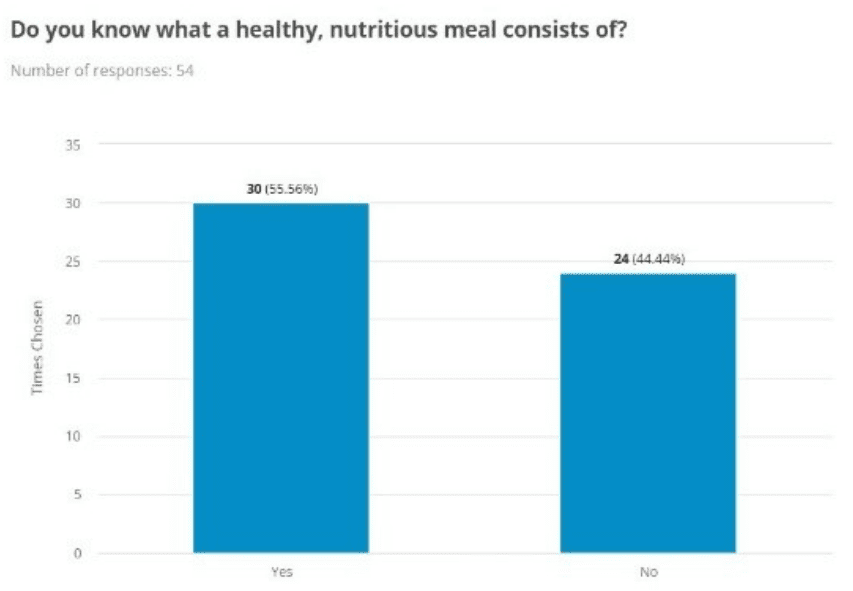
How we respond to our needs matters. The food we eat matters.
According to a May 2023 survey conducted by WRWW, a high percentage (approx. 44%) of refugee & immigrant respondents indicated that they do not know what a healthy, nutritious meal consists of.
The WRWW Commercial Teaching Kitchen will offer nutrition classes and healthy cooking workshops, equipping refugees and immigrants with the knowledge and skills they need to prepare nourishing food for themselves and their families.
Healthy food brings our bodies strength, healing and vitality.
A KITCHEN TO INSPIRE DREAMS
Refugees and immigrants arriving in Washington have left much behind. But they also bring so much with them. They bring pieces of their culture, creativity, ambition, skills and dreams. They come with so much to offer to our community.
World Relief Western Washington believes in the inherent resiliency of refugees and immigrants and is committed to coming alongside the refugee-immigrant community to equip them to thrive in their new home. Developing cooking skills and building knowledge and connections within the food industry provides refugees and immigrants with more opportunities for employment and creative economic endeavors. Programming won’t only focus on the culinary arts or business pathways. Workshops will be designed in such a way as to draw out creativity, instill confidence, and inspire dreams both new and old.
With the completion of the WRWW Commercial Teaching Kitchen we celebrate the realization of one dream and look forward to the start of many more!
World Relief Argues Detaining Children Should Stay Off the Table
March 19, 2023
CONTACT:
Pinkston Team
wr@pinkston.co
World Relief is troubled by recent reports indicating that the Biden administration is considering the reinstatement of migrant detention policies utilized by previous administrations. Restoring these policies would allow the government to temporarily hold immigrant families – including young children – in jail-like facilities upon their arrival to the United States while they await a court hearing. As a Christian humanitarian organization, we remain steadfast in our opposition to inhumane policies that harm children, separate families, and create additional hardship for those fleeing violence and persecution.
“Families who have endured a dangerous journey to the U.S. border in order to seek asylum, seeking to avail themselves of protections offered under U.S. law to those who can demonstrate a credible fear of persecution, should not be held in jail-like detention facilities. Frankly, children never belong in such conditions,” said Aerlande Wontamo, Senior Vice President of US Programs at World Relief. “As Christians who believe each of these children and their parents are made in God’s image with inherent dignity, we hope and pray that reports that the Biden administration is considering reviving this process are inaccurate or at least that the broad opposition to such policies leads them to ultimately reject policies that would revive the practice of detaining children.”
World Relief calls on President Biden to fulfill his promise to “secure our border, while ensuring the dignity of migrants and upholding their legal right to seek asylum” by rejecting family detention policies and, instead, investing in more cost-efficient and humane alternatives.
“Among the many policy changes needed to ensure a more orderly asylum system and a more secure border, one change that the Biden administration ought not to consider is a revival of the unjust practice of detaining children in jail-like facilities. While not every family that arrives at the U.S.-Mexico border will qualify for asylum, it’s vital that each is afforded due process to present their case and that we treat everyone – and especially children, given their unique vulnerabilities – humanely,” said Matthew Soerens, Vice President of Policy & Advocacy at World Relief. “There is ample evidence that families who are placed into alternative detention programs will show up for their immigration court hearings in the vast majority of cases, and while we need Congress to invest in significantly increasing asylum adjudication capacity and legal representation for asylum-seeking families, detaining children while they wait for hearings should be off the table.”
To download a PDF version of this press release, click here.
“World Relief Cup” Raises Support for Refugee Resettlement Services
In recognition of World Refugee month in June, World Relief Western Washington is hosting the inaugural World Relief Cup soccer tournament to celebrate the resilience and contributions of local refugees.
The tournament begins at 9 a.m. and the championship games occur at 6:00 p.m. The final awards ceremony and celebration will take place at 7:30 p.m. Individuals and teams can raise support for refugees rebuilding their lives in Western Washington by registering to participate in the tournament or by sponsoring participants.
Saturday, June 10 at Valley Ridge Fields
“As we celebrate the resiliency and courage of those who have been forced to flee their home country, The World Relief Cup event will open up opportunities for different communities to come together,” said Medard Ngueita, the Executive Director of World Relief Western Washington.
“We hope the event will provide an opportunity to not only celebrate together, but to help raise awareness around mass displacement and the need for better integration of our new neighbors.”
Through the World Relief Cup, the Western Washington offices of World Relief aim to increase awareness of the challenges refugees face in the resettlement process and provide support that empowers them to rebuild their lives in their new community. The event will include competitive soccer tournaments, as well as booths, food trucks, and other fun activities that will be open to the community.
“Refugees are our friends and neighbors, and we encourage this community to embrace them as such.”
said Annie Frisbie, Director of Strategic Advancement, World Relief Western Washington.
By offering our support to these new community members as they acclimate and seek to rebuild their lives here in Western Washington, we treat them with the dignity and respect they deserve as individuals made in the image of God.”
Community members are encouraged to participate in the World Relief Cup by volunteering to help with the event, signing up to play with a team, or sponsoring teams or individuals who are participating in the tournament. To register for this event as a team or individual, please visit the World Relief Western Washington events page and reserve a spot: https://worldrelief.org/world-relief-cup
Thurston County Hosts “From Home to Home” Refugee Resettlement Simulation Event
In recognition of the thousands of refugees who are forcibly displaced from their home countries each year, the Thurston County office of World Relief is hosting “From Home to Home” – an experiential exhibit demonstrating the challenges these refugees face when coming to the United States. The event will take place in Olympia on May 19 – May 22, with sessions available both for groups and individuals from 8:00 a.m. to 7:00 p.m. at 812 Central St SE. Sessions in the exhibit will simulate the common decisions and difficulties refugees and asylum seekers face on their journey to resettlement.
“Refugees and asylum seekers who are forcibly displaced from their homes have experienced challenges and dangers that many of us cannot begin to comprehend,” said Annie Frisbie, Director of Strategic Advancement. “Through this exhibit, we hope to create awareness of both the trauma of displacement and the difficulties they endure on their journey to the United States. By doing so, we can better work together as a community to ensure those who have experienced such difficulty can find support in Thurston County.”
Through this exhibit, the Thurston County office of World Relief is aiming to increase understanding of the unique vulnerabilities of refugees and asylum seekers who have been forcibly displaced and highlight the need to assist them in rebuilding their lives in the United States. This exhibit to increase awareness is coupled with the office’s continuing work serving displaced individuals in Western Washington by assisting them in securing safe housing and providing cultural orientation services.
“Refugees and asylum seekers need our support to both navigate an unfamiliar culture and an uncertain future in their new homes,” said Annie Frisbie. “They have suffered significant challenges before and during their journey here, but our community has an opportunity to demonstrate God’s love for them by welcoming them with open arms and helping to ease their transition to rebuilding lives in the United States.”
Schools, local businesses, first responders, faith groups, and individuals are all encouraged to participate in the exhibit. To register for this event as a group or an individual, please visit the World Relief Western Washington “From Home to Home” events page and reserve a spot: https://worldrelief.org/from-home-to-home
They Unpaved a Parking Lot and put up Paradise Plots- Article from Seattle Refined
Nestled in 1.5 acres of a de-paved parking lot in Kent, World Relief’s Paradise Parking Plots is a flourishing community garden, complete with 50 garden plots, rain gardens, cisterns and restoration areas. Community members come together to grow food, share gardening tips and foster this vibrant green space.
In 2016, World Relief Western Washington, an organization that welcomes immigrants and newly-arriving refugees by providing services such as housing, English language classes, employment and immigration legal services, held community listening sessions to learn how they could best serve the community.
In these sessions, community members expressed interest in having a space to garden.
(Photo Credit: Sean Puno, Talitha Consultants, Tilth Alliance)
Many community members shared that they come from backgrounds where growing food is a common practice, but now live in apartments and have limited space to grow their own food. And in these apartment complexes, there is often limited safe space for their children to play outside. Community members also noted that finding fresh, culturally-appropriate produce in local grocery stores and markets is challenging.
The community wanted a garden, so Paradise Parking Plots was born.
And now, what started as an oversized, unused parking lot at Hillside Church in Kent’s East Hill neighborhood has been transformed into a life-giving community garden.
Individual community members have a safe place to grow food, learn about gardening techniques in the Pacific Northwest, and share ideas and seeds with other gardeners.

(Photo Credit: Hannah Letinich)
Read stories about the gardeners, like Bhutanese gardeners who grew up in a farming community and spent time assisting local farmers while living in a refugee camp in Nepal; an Iraqi gardener who grows organic produce for her family; and a Ukrainian gardener who shares how he feels relaxed and calm when at the garden.
Lucas McClish, Community Garden Coordinator, points out that something that had no life – an asphalt parking lot – has become a place where food grows and nourishes people.
But, McClish notes, the garden is more than just a green space for growing food. It was designed and built to have significant environmental benefits. For example, the garden has 4,000-gallon rainwater collection cisterns to collect rainwater from the church roof for irrigation, five onsite rain gardens, and a flood-mitigating bioswale that collectively diverts over 1.1 million gallons of stormwater annually. The garden is used as an educational site for local middle school science classes, and young people volunteer in the garden as they learn about the environment and green infrastructure.
(Photo Credit: Sean Puno, Talitha Consultants, Tilth Alliance)
You don’t have to live near the garden to participate. Here are ways you can help the garden continue to flourish:
- Volunteer: As you can imagine, there’s always more to be done in and for the garden. In addition to occasional group volunteer events, volunteers with specific experience in botany, agriculture, construction, environmental education, or translation help the garden thrive.
- Financial Giving: It takes money to keep the garden up and running. From plants to irrigation supplies to subsidized garden plots (each plot costs $40/year to rent), financial gifts help the garden run smoothly.
- Gifts-In-Kind: In addition to financial gifts, you can donate gift-in-kind items, such as garden tools or plant starts.
Learn more about World Relief’s Paradise Parking Plots Community Garden here.
World Relief Announces Opening of New Location in Western Washington to Welcome Refugees to Thurston County
March 08, 2023
CONTACT:
Pinkston Team
wr@pinkston.co
Olympia, WA – World Relief is opening a new office location in Western Washington to provide refugee resettlement services to those in Thurston County. The grand opening of the Thurston County location will occur Friday, March 10 at the New Bridge Community Church from 10 a.m. – 3 p.m., with the official ribbon-cutting ceremony set to occur at 10:30 am.
“We are thrilled to open this new office as an expansion of Western Washington’s efforts to welcome refugees and demonstrate God’s heart for displaced people,” said Medard Ngueita, Executive Director of World Relief Western Washington. “At World Relief, we walk alongside refugees and immigrants in the beginning stages of their move to Washington to help them rebuild a sense of home.”
World Relief’s Thurston County office will provide resettlement support for refugees entering the community by helping them secure safe housing and providing services such as cultural orientation and assistance in enrolling children in local schools. This new location anticipates welcoming at least 50 refugees in its first year of operation. As in all World Relief locations, the new Thurston County office will work closely with local churches and volunteers to facilitate the integration process. To welcome refugees as they first arrive in Western Washington, the office is seeking host home volunteers and cultural companions, along with community assistance in creating welcome kits that meet refugees’ most immediate needs.
“Refugees are a uniquely vulnerable group of people who need support when they first arrive in their new communities,” said Aerlande Wontamo, Senior Vice President of US Programs at World Relief. “World Relief aims to provide them with resources and support that empowers them to start their lives in the United States with confidence.”
This Thurston County office is the most recent addition to World Relief’s growing presence in Western Washington, as the new location joins offices in King County and Whatcom County.
To learn more about World’s Relief’s work in Washington and how to get involved, please visit worldrelief.org/western-wa/.
To download a PDF version of this press release, click here.
5 Things You Need to Know about Chad
Chad is home to one of the most diverse and vibrant people groups on the planet. The country also faces multiple humanitarian crises including political uncertainty, food insecurity and climate instability.
Over five million people are food insecure, and nearly 1.7 million suffer from recurrent cases of preventable diseases. What’s more, Chad plays host to thousands of refugees and internally displaced people — a displacement crisis that The United Nations High Commissioner for Refugees (UNHCR) says tends to go underfunded, in spite of the country’s evident need.
That’s why this year, World Relief is expanding its programming into Chad, compelled by our faith to go further and reach deeper to respond to the needs of the most vulnerable.
While Western news and media outlets often overlook stories from this Central African country, we believe it’s essential for you to get to know the people and the places where World Relief operates. With that in mind, here are 5 things you need to know about Chad, its people and its history.
1. Chad is one of the world’s most ethnically and linguistically diverse countries.
Home to over 200 ethnic groups who speak over 100 languages, it’s little wonder Chad earned the moniker “Babel Tower of the World.” The country’s two official languages are Arabic and French, echoing the country’s not-so-distant colonial past.
About 75% of Chad’s population live in rural areas and belong to a nomadic or pastoral tribe, while others primarily live in and around the capital city of N’Djamena.
2. Lake Chad, a primary ecosystem and food source, has lost 90% of its original surface area and counting.
Many people depend on Lake Chad for fishing, farming and as a watering source for herds of cattle and goats. Yet because of climate change, the lake’s ability to serve as a sufficient resource shrinks yearly, contributing to conflict over access to its shores.
Extreme weather patterns in the region prohibit the primarily agrarian society from reaping sufficient harvests year after year. The length of “lean seasons,” the time before crops are ready to harvest, also continues to grow.
Faced with such volatile weather and arid land, some Chadians are now partnering with scientists to integrate indigenous farming methods and rehabilitate the dry land.
Hindou Aoumarou Ibrahim, a Chadian activist and President of the Association for Indigenous Women and Peoples of Chad, advocates for the importance of using traditional knowledge to combat the effects of climate change in Chad.
3. Chad hosts over 555,000 refugees and over 400,000 internally displaced persons (IDPs).
Despite Chad’s turbulent government, its doors remain open to refugees from South Sudan, Cameroon, the Central African Republic (CAR) and Nigeria, all bordering countries impacted by violence and climate change.
For example, Chad shares a border with Sudan’s Darfur region. Though not as prevalent in the news today, Darfur saw high rates of conflict in the early 2000s, which contributed to large numbers of refugees fleeing across its border to Chad.
4. As of 2020, the WHO reports a shortage of medical professionals in Chad — less than one medical doctor for every 10,000 people.
Similar to many countries during the height of the COVID-19 pandemic, Chad found its health system even more constrained by a shortage of doctors and a rising number of cases mid-2020. Chad also contended with a need for essential medical equipment, such as ventilators, medicines and vaccines.
Yet months after the pandemic began, the UN developed an innovative partnership with troubadours, or traditional storytellers, to deliver and communicate information about the virus to Chad’s remote and nomadic communities — in much the same way World Relief equipped church and community leaders in places like Rwanda. These troubadours, along with community-selected health workers, traveled between communities and, instead of news or songs, shared critical health safety measures (i.e. social distancing) to help stop COVID from spreading.
5. Chad ranks 187th out of 189 countries on the Human Development Index, and 42% of the country lives below the national poverty line.
A land-locked country of 16.8 million, Chad ranks among the poorest countries in the world today. More than 6.1 million Chadians require humanitarian assistance as of 2022, almost one-third of the country’s population.
The need in Chad is two-fold: immediate emergency responses and capacity building for holistic, long-term sustainability and ministry.
What is World Relief doing?
In 2023, World Relief will open a new office in Chad.
The Southern portion of Chad — a Christian-majority region where population density is high and humanitarian actors are few — is ideal for World Relief’s holistic ministry model. Additionally, the number of Christian humanitarian agencies who work closely with churches in the area is limited and competition for funding is low. Existing local, faith-based NGOs are in need of capacity building from an international Christian NGO like World Relief to scale and expand impact.
At World Relief, our mission calls us to listen and walk alongside the men, women and children of Chad. As our world continues to change, we must respond in new ways and go further than ever.
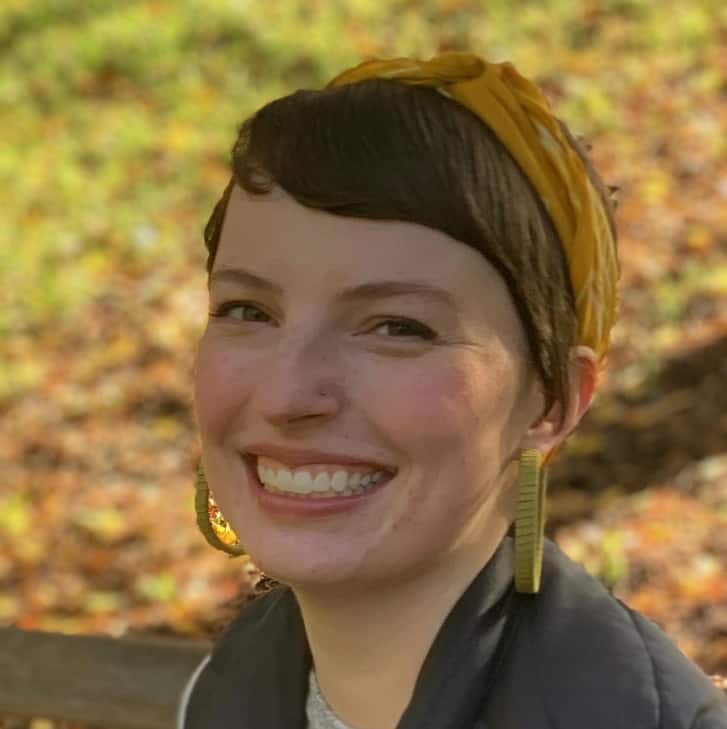
Meghan Gallagher is a Seattle-based freelance content writer and strategist. She has a B.S. in Marketing Management and a background in digital marketing for healthcare, nonprofit, and higher education organizations. When she’s not writing, you can find her working as a local bookseller and enjoying all the Seattle area has to offer.













